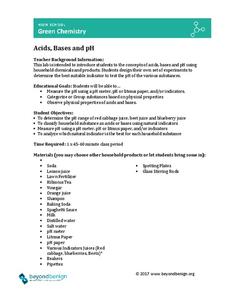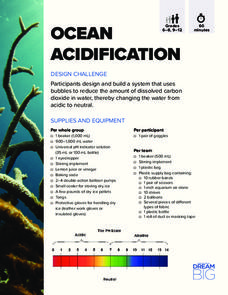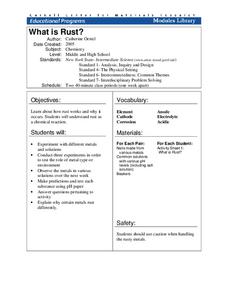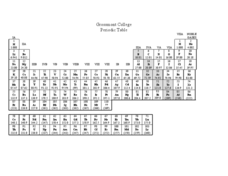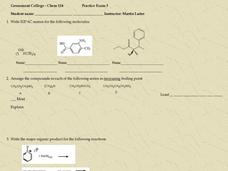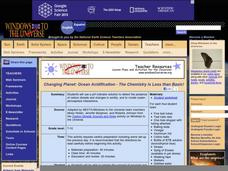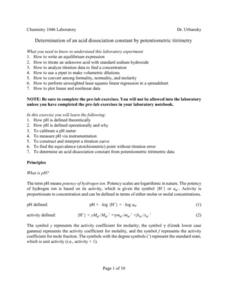DiscoverE
Water Pollution Cleanup
How do scientists determine the best method for removing pollutants from our water sources? Environmental scholars experiment with pollution clean-up options to discover which are the most cost-effective, fastest, and most thorough....
National Wildlife Federation
Ghost Town
Around 93 percent of the reefs on Australia's Great Barrier Reef have been bleached, and almost one quarter of them are now dead. Scholars research the sea temperatures, especially around the areas with coral reefs, to make connections...
American Chemical Society
Carbon Dioxide Can Make a Solution Acidic
Can your breath change the acidity in a liquid? A lesson begins with a demonstration that proves it can. Then scholars perform an experiment to determine if other gases can change the pH of liquids. Finally, they research how this...
Scholastic
Study Jams! Acids and Bases
This video about pH will not leave a sour taste in your mouth! Through clear explanations and a little humor, upcoming chemists will learn the definitions and properties of acids and bases, as well as how pH is measured. This would make...
Beyond Benign
Acids, Bases and pH
Color can tell a lot about a substance. Scholars test several solutions to determine pH. Once the results are complete, they then use the pH tests to classify substances as acids and bases.
Beyond Benign
Shampoozled—Part 2: pH Neutral
Who doesn't want balance in shampoo?!? The second of a two-part lesson plan continues the preparation of a shampoo formula. This time, individuals focus on how to control the pH of the product. This is the 12th installment of the overall...
Beyond Benign
pH Neutral
Acids and bases combine to create our most popular shampoos—who knew?! Using the eighth lesson in a 24-part series, your classes study how acids and bases combine to create safe mixtures such as those in your scholars' shampoos. They...
DiscoverE
Ocean Acidification
Combat ocean acidification with bubbles. Young engineers create a system that reduces the acidity of water. Dry ice in water helps simulate ocean acidity, and blowing bubbles into the water results in a gas exchange that neutralizes the...
Cornell University
What Is Rust?
Why do metals rust differently? Scholars experiment with metal combinations in a hands-on activity. They create unique environments with different metals and compare the rate and amount of rust for each.
NOAA
Off Base
How does carbon dioxide affect the world's oceans? The final installment in a series of six lessons has pupils research ocean acidification, then conduct an experiment to witness the delicate balance that exists in our seas. Materials...
Cornell University
Study Soil
What's in soil? Young scientists study the pH levels of soil from their school yard. They observe the land and area the soil came from to decide if location has anything to do with acidity level.
Teach Engineering
Red Cabbage Chemistry
Using the natural pH indicator of red cabbage juice, groups determine the pH of different everyday liquids. As they work, pupils gain an understanding of pH that may help deal with contaminants in the water supply.
NOAA
Ocean Acidification
If tap water is more acidic than ocean water, why are we so concerned about ocean acidification? The third installment of a 23-part NOAA Enrichment in Marine sciences and Oceanography (NEMO) program focuses on carbon dioxide levels in...
Virginia Department of Education
Acids and Bases
What did one titration say to the other titration? We should meet at the end point! Young chemists perform four experiments: dilute solution, neutralization, titration, and figuring pH/pOH.
Chymist
Visualizing pH
Why are acids and bases important in our daily lives? Lead the class in answering this question, among others, as they experiment with pH paper and classify where various substances belong on the pH scale. They also taste common acids...
NASA
Cleaning Water
Give young scientists a new appreciation of fresh, clean drinking water. After learning about the ways astronauts recycle their air and water, your class will work in small groups creating and testing their very own water...
Curated OER
Chemistry 116 Exam 2 Summer 2009
Written for an introductory organic and biochemistry course, this exam will challenge your class. They label functional groups and stereocenters on drawings of molecules, draw structures given the name, complete drawings of chemical...
Curated OER
Grossmont College - Chem 116 Practice Exam 3
This biochemistry practice exam queries takers on the organic molecules. Pupils write IUPAC names, identify boiling and melting points of different compounds, and more. This is definitely designed for a college-level biochemistry course,...
Curated OER
Changing Planet: Ocean Acidification - the Chemistry is Less than Basic!
A video and laboratory investigation are highlights to this lesson on acidification of ocean water due to increased atmospheric carbon dioxide. Using bromothymol blue (BTB) as an indicator, pupils analyze the amount of carbon dioxide...
Curated OER
Organic Chemistry II Exam 3
In this chemistry worksheet, students determine which compound is the most acidic in each multiple choice question. Then they determine what the major product would be in each of the reactions stated on the sheet.
Curated OER
Determination of An Acid Dissociation
In this chemistry worksheet, students examine the given concept in order to apply in the laboratory setting. The sheet includes in depth background information.
Curated OER
Acidity of Foods
Students investigate the acidity of foods using titration. In this acidity of foods lesson plan, students find the acid concentration of 4 fruit juices by titrating them each with sodium hydroxide and an indicator to find the end point. ...
Curated OER
Can Acids and Bases Remedy the Body?
Students try to cure an upset stomach. In this acids and bases in the body activity, students create a upset stomach with a vinegar and water solution, then use antacids and home remedies to attempt to restore pH balance to the mixture.
Curated OER
Acids/Bases and Buffers
In this acids, bases and buffers worksheet, students define terms, solve problems such as calculating the pH of solutions and the molarity of solutions and they write balanced equations of neutralization reactions.






